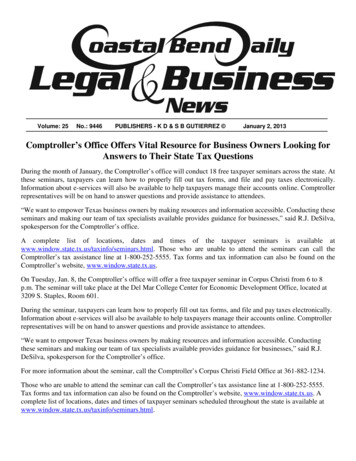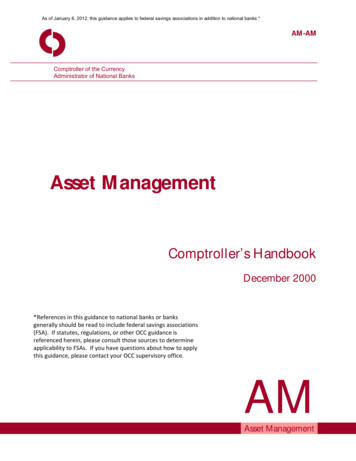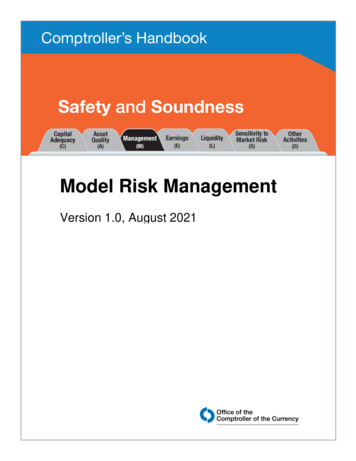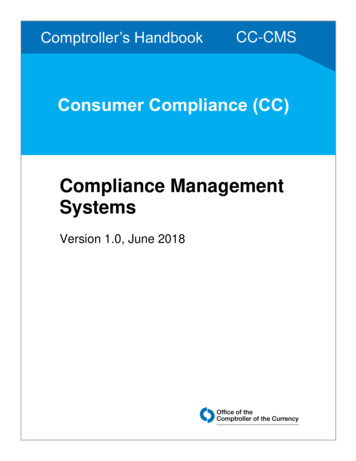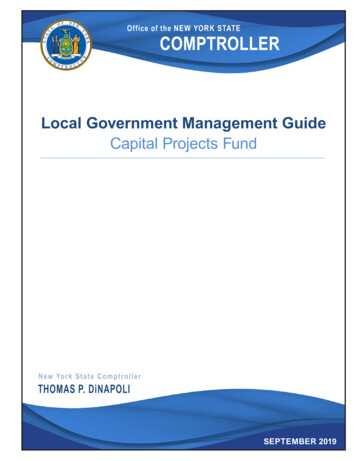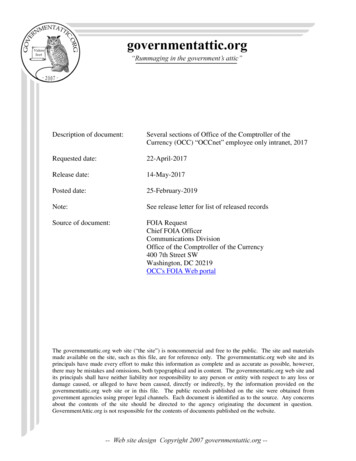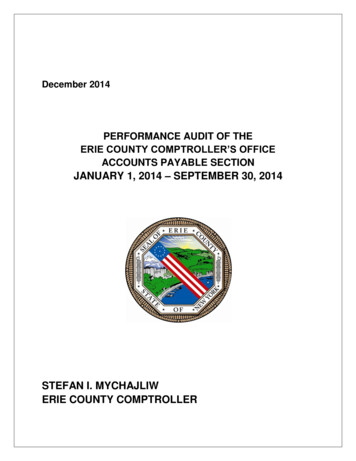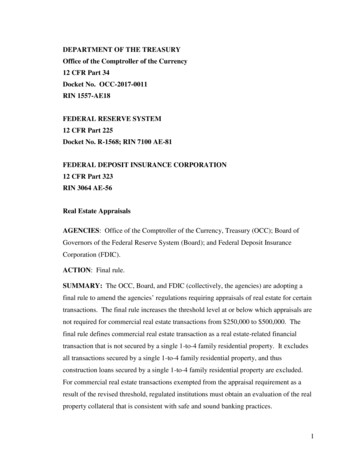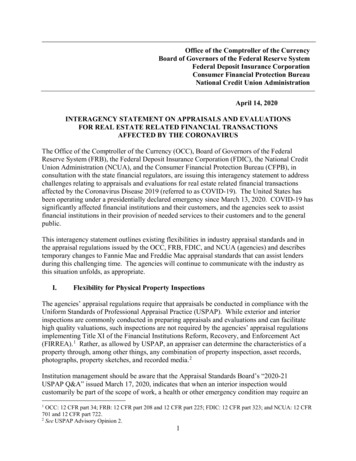
Transcription
Office of the Comptroller of the CurrencyBoard of Governors of the Federal Reserve SystemFederal Deposit Insurance CorporationConsumer Financial Protection BureauNational Credit Union AdministrationApril 14, 2020INTERAGENCY STATEMENT ON APPRAISALS AND EVALUATIONSFOR REAL ESTATE RELATED FINANCIAL TRANSACTIONSAFFECTED BY THE CORONAVIRUSThe Office of the Comptroller of the Currency (OCC), Board of Governors of the FederalReserve System (FRB), the Federal Deposit Insurance Corporation (FDIC), the National CreditUnion Administration (NCUA), and the Consumer Financial Protection Bureau (CFPB), inconsultation with the state financial regulators, are issuing this interagency statement to addresschallenges relating to appraisals and evaluations for real estate related financial transactionsaffected by the Coronavirus Disease 2019 (referred to as COVID-19). The United States hasbeen operating under a presidentially declared emergency since March 13, 2020. COVID-19 hassignificantly affected financial institutions and their customers, and the agencies seek to assistfinancial institutions in their provision of needed services to their customers and to the generalpublic.This interagency statement outlines existing flexibilities in industry appraisal standards and inthe appraisal regulations issued by the OCC, FRB, FDIC, and NCUA (agencies) and describestemporary changes to Fannie Mae and Freddie Mac appraisal standards that can assist lendersduring this challenging time. The agencies will continue to communicate with the industry asthis situation unfolds, as appropriate.I.Flexibility for Physical Property InspectionsThe agencies’ appraisal regulations require that appraisals be conducted in compliance with theUniform Standards of Professional Appraisal Practice (USPAP). While exterior and interiorinspections are commonly conducted in preparing appraisals and evaluations and can facilitatehigh quality valuations, such inspections are not required by the agencies’ appraisal regulationsimplementing Title XI of the Financial Institutions Reform, Recovery, and Enforcement Act(FIRREA). 1 Rather, as allowed by USPAP, an appraiser can determine the characteristics of aproperty through, among other things, any combination of property inspection, asset records,photographs, property sketches, and recorded media. 2Institution management should be aware that the Appraisal Standards Board’s “2020-21USPAP Q&A” issued March 17, 2020, indicates that when an interior inspection wouldcustomarily be part of the scope of work, a health or other emergency condition may require anOCC: 12 CFR part 34; FRB: 12 CFR part 208 and 12 CFR part 225; FDIC: 12 CFR part 323; and NCUA: 12 CFR701 and 12 CFR part 722.2See USPAP Advisory Opinion 2.11
appraiser to make an extraordinary assumption about the interior of a property. 3 USPAPpermits this approach as long as the appraiser has a reasonable basis for the extraordinaryassumption and as long as its use still results in a credible analysis. Both desktop appraisalsand exterior-only appraisals can fulfill the requirements of USPAP as long as the analysis iscredible. 4 Interior inspections are still required, however, for certain higher-priced mortgageloans. 5II.Flexibility for Appraisals of Residential Properties Underwritten to FannieMae and Freddie Mac StandardsFannie Mae and Freddie Mac (hereinafter, the GSEs) have recently issued guidance providingtemporary flexibility in the appraisal standards for loans that they purchase, including allowingexterior-only and desktop appraisals for certain loans. 6 Specifically, the GSEs’ guidance statesthat: For certain qualifying principal or primary residence loans, desktop appraisals andexterior-only appraisals will now be acceptable. For Freddie Mac, qualifying primaryresidence loans are those with up to 97 percent loan-to-value (LTV). For Fannie Mae,qualifying primary residence loans are those with an LTV within the range listed onFannie’s current eligibility matrix. For second homes and investment properties with 85 percent or less LTV, desktopappraisals and exterior-only appraisals will now be acceptable. For limited cash-out refinances where the mortgage being refinanced is owned by theGSE and the LTV is within the currently acceptable range, exterior-only appraisals willnow be acceptable.In addition, lenders may sell eligible loans without an appraisal under the appraisal waiverprograms provided by the GSEs. 7 For Freddie Mac, the appraisal waiver program for lendersis now being expanded to include certain refinancing activity, including both cash-outrefinances and no cash-out refinances. Fannie Mae already allowed lenders to waive theSee March 2020 Q&A at ards/Q As/TAF/QAs.aspx.See USPAP Scope of Work Rule, Standard Rule 1-2, and Advisory Opinion 2.5Interior inspections are required for certain higher-priced mortgage loans (HPMLs) pursuant to the InteragencyHPML Appraisal Rule, implementing statutory requirements under the Truth in Lending Act, 15 U.S.C. § 1601 etseq. See 15 U.S.C. § 1639h. This rule was issued jointly by the OCC, FRB, FDIC, NCUA, CFPB, and FederalHousing Finance Agency (FHFA). See 78 FR 10367 (Feb. 13, 2013) and 78 FR 78520 (Dec. 26, 2013); OCC: 12CFR Part 34, subpart G; Board: 12 CFR 225.64; NCUA: 12 CFR 722.3; CFPB: 12 CFR 1026.35(a) and (c); andFHFA: 12 CFR 1222, subpart A. The FDIC adopted the HPML Appraisal Rule as published by the CFPB withoutissuing its own regulation.6See play a id/1003723.7For additional information, see Fannie Mae Selling Guide B4-1.4-10 and Freddie Mac Selling Guide Section5601.9, respectively, available at 78771/B4-1-4-10-Appraisal-Waivers-08-07-2019.htm, 5601.9.342
appraisal requirement for some refinance transactions. 8III.Existing Exceptions in Appraisal RegulationsThe appraisal regulations issued by the OCC, FRB, and FDIC provide at least fourteenexceptions to the requirement for an appraisal by a certified or licensed appraiser. 9 Exceptionsthat lenders may find the most useful during the COVID-19 emergency for real-estate relatedfinancial transactions include: The transaction is a residential real estate transaction with a transaction value of 400,000or less; The transaction is a commercial real estate transaction with a transaction value of 500,000 or less; The transaction is a business loan that has a transaction value of 1 million or less wherethe loan does not depend on the sale of, or rental income derived from, real estate as theprimary source of repayment; The transaction involves an existing extension of credit at the lending institution,provided that: 10o There has been no obvious and material change in market conditions or physicalaspects of the property that threatens the adequacy of the institution’s real estatecollateral protection after the transaction, even with the advancement of newmonies; orFor additional information, see Fannie Mae LL 2020-04 and Freddie Mac Bulletin 2020-5, available isplay /1003723 7.9For a comprehensive list of exceptions, see OCC: 12 CFR 34.43(a); FRB: 12 CFR 225.63(a); and FDIC: 12 CFR323.3(a).10Loan modifications, extensions, or similar arrangements, such as those that may be provided in connection withmortgage forbearances required under Sections 4022 and 4023 of the CARES Act, do not require appraisals underthe agencies’ appraisal regulations if the transaction is wholly or partially insured or guaranteed by a federalagency or government-sponsored enterprise (GSE), such as Fannie Mae or Freddie Mac. Such transactions wouldinstead be subject to the valuation standards required by the agency or GSE. Relatedly, the agencies’ appraisalregulations generally would not require an appraisal for this type of transaction, as the agencies’ appraisalregulations do not require an appraisal for a transaction involving an existing extension of credit at the lendinginstitution (i.e., subsequent transactions) if there is not a new advance of funds, other than funds necessary to coverreasonable closing costs. Rather, an evaluation is permitted in lieu of an appraisal under those circumstances. OCC:12 CFR § 34.43(a)(7),(b); FRB: 12 CFR § 225.63(a)(7),(b); FDIC: 12 CFR § 323.3(a)(7),(b); and NCUA: 12 CFR §722.3(a)(1) also permit an evaluation for extensions of credit at the lending institution if there has been no obviousand material change in market conditions or physical aspects of the property that threatens the adequacy of the realestate collateral protection after the transaction, even with advancement of new funds. Note additionally that a loanmodification that only entails a decrease in the interest rate or a single extension of a limited or short-term naturewould not be viewed as a subsequent transaction, and as such, not require an evaluation. Interagency Appraisal andEvaluation Guidelines. See 75 FR 77450, at 77464-77465 (December 10, 2010), available at 0/75fr77450.pdf.83
o There is no advancement of new monies, other than funds necessary to coverreasonable closing costs; The transaction is wholly or partially insured or guaranteed by a U.S. government agencyor U.S. government sponsored agency; The transaction either:o Qualifies for sale to a U.S. government agency or government sponsored agency;oro Involves a residential real estate transaction where the appraisal conforms to theFannie Mae or Freddie Mac appraisal standards.In addition, on April 14, 2020, the FDIC, FRB, and OCC issued an interim final ruletemporarily amending their appraisal regulations to provide that the completion of appraisalsand evaluations required under the agencies’ appraisal regulations may be deferred by aregulated institution for up to 120 days from the date of closing. The temporary deferrals applyto all residential 11 and commercial real estate secured transactions, including loans for newmoney or refinancing transactions, but excluding transactions for acquisition, development,and construction of real estate, and will be effective upon publication in the Federal Register.The deferred appraisals and the interim final rule will sunset on December 31, 2020.The appraisal regulations issued by the NCUA provide nine exceptions to the appraisalrequirements for an appraisal by a certified or licensed appraiser. 12 Exceptions that institutionsmay find the most useful during the COVID-19 emergency for real estate related financialtransactions include: The transaction is a residential real estate transaction with a transaction value of lessthan 250,000; 13 The transaction is a residential real estate transaction with a transaction value greater than 250,000, but less than 1 million, and the portion of the transaction value that is insuredor guaranteed by a U.S. government agency or U.S. government sponsored agency is 250,000 or more;Under the Equal Credit Opportunity Act (ECOA) and its implementing Regulation B, creditors are generallyrequired to provide applicants for first-lien loans on a dwelling with copies of appraisals, as well as other writtenvaluations, developed in connection with an application prior to the consummation of the transaction. See 15 U.S.C.1691(e) and Regulation B, 12 CFR 1002.14 (“ECOA Valuations Rule”). Nothing in ECOA or Regulation Baddresses the type of post-consummation valuation contemplated in the agencies’ April 14, 2020 interim finalrule. The agencies, therefore, will not take enforcement actions against institutions under the ECOA ValuationsRule for post-consummation valuations performed pursuant to the agencies’ April 14 interim final rule.Nevertheless, the agencies encourage institutions to provide borrowers with copies of such post-consummationvaluations as promptly as practicable upon completion.12For a comprehensive list of exceptions, see 12 CFR 722.3(a) and (b).13The residential real estate threshold for the NCUA is currently 250,000 and the NCUA recently issued a noticeof proposed rulemaking to raise the threshold to 400,000.114
The transaction is a commercial real estate transaction with a transaction value of lessthan 1,000,000; 14 The transaction involves an existing extension of credit at the lending credit union,provided that:o There is no advancement of new monies, other than funds necessary to coverreasonable closing costs; oro There has been no obvious and material change in market conditions or physicalaspects of the property that threatens the adequacy of the credit union's realestate collateral protection after the transaction, even with the advancement ofnew monies; The transaction either:o Qualifies for sale to a U.S. government agency or U.S. governmentsponsored agency; oro Involves a residential real estate transaction in which the appraisalconforms to the Fannie Mae or Freddie Mac appraisal standards applicableto that category of real estate.The agencies encourage financial institutions to make use of these exceptions. The use of anexisting appraisal or evaluation for subsequent transactions may be particularly relevant duringthe COVID-19 emergency. A financial institution can use an existing evaluation or appraisalinstead of obtaining a new appraisal for a subsequent transaction in certain circumstances if theinstitution can confirm that the evaluation or appraisal remains valid.The passage of time is a criterion that institutions can consider when determining whether anappraisal remains valid. If the institution determines that the appraisal still reflects marketvalue, the institution may rely on the appraisal based on an acceptable level of risk asevidenced by a loan’s LTV ratio and other underwriting criteria.The agencies understand that it may be appropriate for institutions to have different criteria forassessing the validity of an appraisal or evaluation for purposes of subsequent transactionsduring major disasters or other emergencies. The institution’s determination of the validity ofexisting appraisals and evaluations used for subsequent transactions conducted during theCOVID-19 emergency will not be subject to examiner criticism if it is consistent with safe andsound practices.The NCUA appraisal regulations for commercial real estate set a 1 million threshold for all commercial loans.See 12 CFR 722(b)(1).145
Federal Deposit Insurance Corporation Consumer Financial Protection Bureau National Credit Union Administration . April 14, 2020 . INTERAGENCY STATEMENT ON APPRAISALS AND EVALUATIONS . FOR REAL ESTATE RELATED FINANCIAL TRANSACTIONS . AFFECTED BY THE CORONAVIRUS . The Office of the Comptroller of the Currency (OCC), Board of Governors of the Federal


